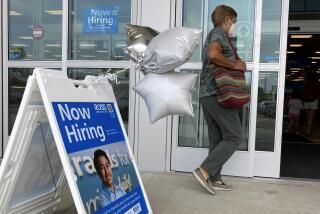Economic Data Suggest Slowing
NEW YORK — A closely watched gauge of future economic activity declined slightly in February after a sharp rise in January, a private research group said Monday.
The decline in the Conference Board’s index of leading economic indicators, which follows four months of gains, suggested to some analysts that the nation’s economic growth would slow in the second half of the year.
The Conference Board said the index fell 0.2% in February after a revised 0.5% rise in January.
The January increase had initially been reported at 1.1%.
Economists on Wall Street had expected the index to decline 0.3% in February.
The Conference Board said its coincident index, a measure of the current economy, rose 0.3% in February after no change in January and a 0.4% increase in December.
In the latest report, the largest negative components were consumer expectations, building permits and stock prices. The positive components included manufacturers’ new orders for nondefense capital goods and orders for consumer goods and materials.
“Essentially the story is, we have got moderate growth through the first quarter. We may tick up in the second quarter and we may tick down in the third quarter,” said Ken Goldstein, economist at the Conference Board. “Growth is going to be a little slower second half of the year.”
Frank Nothaft, chief economist at mortgage consolidator Freddie Mac, said some of the growth anticipated for the first half of the year was related to reconstruction efforts in regions hurt by hurricanes last year.
“This pumps more money into the economy, spurring growth,” he said, adding that the slowdown in the latter half of 2006 would reflect interest rate increases engineered by the Federal Reserve.
The central bank, concerned about inflation that could hobble the economy, has raised interest rates 14 times since June 2004. The increases have in effect raised borrowing costs for consumers and businesses.
The higher rates have had some effect on housing, with home sales slowing, and economists believe that the Fed will raise rates again this month.
Although the index of leading economic indicators declined, the U.S. economy saw gains in the job market in February. Employers expanded payrolls by 243,000 jobs, far more than expected.
As for the sharp downward revision in January’s leading economic indicators, economists at High Frequency Economics Ltd. said the data might have been skewed by a drop in aircraft orders not taken into consideration when the January report was first published.
“The January revision is mostly due to the plunge in aircraft orders reported in the durable goods numbers,” the economists said in a report. “The durables report was not available when the [leading economic indicators] was compiled, so the Conference Board assumed orders for nondefense capital goods were unchanged.”
More to Read
Inside the business of entertainment
The Wide Shot brings you news, analysis and insights on everything from streaming wars to production — and what it all means for the future.
You may occasionally receive promotional content from the Los Angeles Times.










